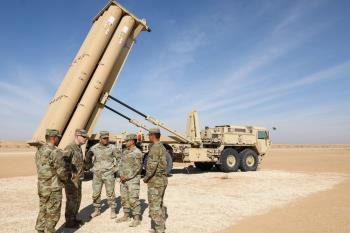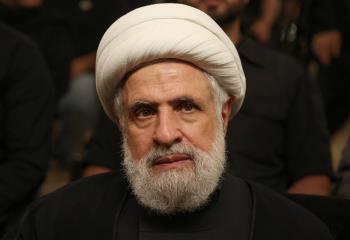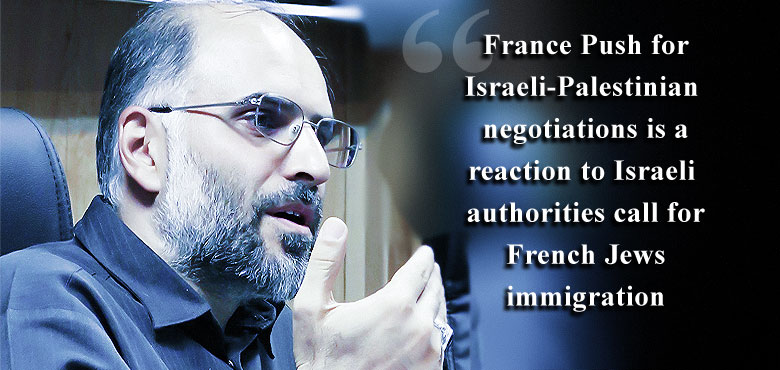Alwaght- In an unprecedented standing, the French Foreign Minister Laurent Fabious has warned that Paris would officially recognize the state of Palestine, should the efforts to implement the two-state solution reach a dead end. These stances by Fabious are seen as surprising because in France’s political scene the French government and the French right-wing foreign minister are known as holding extremely close relations with the Israeli regime.
Accordingly, Alwaght has conducted an interview with Alireza Soltanshahi, Palestine’s affairs expert and the head of the Institute of Palestinian Studies, discussing the recent stance of France’s Fabious on official recognition of an independent Palestinian state by Paris.
Following is the full-text of Alwaght website's Interview with Iran-based political expert, originally hold in Farsi.
Alwaght: when was the two-state solution proposed and what objective did the West and especially France follow by proposing such an initiative?
Soltanshahi: In fact, the two-state solution, which was originated in Oslo peace talks, was the sole choice left for the West and the global powers to settle the Palestinian issue. But, In fact, the Zionists have not shown a persistent adherence to the twenty-year old two-state solution, and during different periods, different viewpoints have been released on the initiative by the Zionists.
Considered as the most extremist right-wing government, the current Israeli government is fully against this solution. But this policy is followed by the Western powers because by implementation of the initiative the Israeli regime would have specified borders, and its population would be settled within its own borders. This solution would make the regime internationally recognized and settled. On the Palestinian side, the Palestinians would be given the territories that should be returned to them, though many issues including the fate of five million Palestinian refugees, the lands that according to resolution 242 should be returned to the Palestinians, Al-Quads Mosque and the settlements built in the Palestinian territories after 1967 would remain unsettled.
In a general view, we can say that although the Palestinian reconcilers have agreed to the two-state solution, the West has proposed the plan and it insists on its implementation to deceive the public opinions. The Zionists at the end of the road would approve the solution after getting more concessions including annexing more lands from West Bank, securing a greater share from Al-Quds and finalizing cancellation of the Palestinian refugees’ right to return home.
Alwaght: How are the Palestinian sides looking at the two-state solution? Could this initiative meet their demands and goals?
Soltanshahi: Clearly, we can categorize Palestinian political players into two different groups. The pro-reconciliation party which seeks settling problems with the Zionists through negotiations, and on the other side stands the party that struggles to put an end to the Israeli occupation and liberate the Palestinian territories using resistance option. The two-state solution is considered unacceptable by the resistant side while the pro-reconciliation side, which after twenty years has not succeeded to achieve its goals, sees no choice but negotiations to survive politically. According to one of the Palestinian Authority’s officials, once the Israeli regime fails to yield to these minimum demands, the Palestinian pro-reconciliation side would tend to consider the resistance option. The remarks of Saeb Erekat (Palestinian chief negotiator) in an interview indicate that the third intifada is the integral option of the Palestinians in response to the Israeli disregard of their demands in the reconciliation process. Though Saeb Erekat has shared this position through a personal view, he wanted to send a message to the Western and the Israeli sides, warning that if they do not grant the Palestinians these basics, they leave the Palestinians with no choice but resistance.
Alwaght: With regard to the fact that the stance on recognition of two states in Palestine is taken by the French Foreign Minister Laurent Fabious, who is considered a figure close to the Israelis, Why have the Israelis bristled at such a position? Essentially, why France has taken such a stance towards the Israeli regime?
Soltanshahi: The remarks of the Jewish French Foreign Minister Laurent Fabious have been made in response to a case in Israeli-French relations, and the remarks are not addressing the real Palestinian issue. If we follow the process, we see that Fabious has said that France, as one of the five permanent members of the United Nations Security Council (UNSC), sought to revive the (Israeli-Palestinian) negotiations and to take diplomatic steps to conclude the reconciliation process.
However, while France as a member of the UNSC has such demands within the body of the UN, there are other issues which are more pivotal and we are observing greater humanitarian requirements, all need to be considered by the UN. These issues include reconstruction of Gaza, most of areas of which have become uninhabitable and destroyed as a result of the Zionists’ three devastating aggressions against the Strip. We have also the Gaza Strips’ siege which has remained unsettled up to now. Furthermore, there is the city of Al-Quds which remains unmentioned while it is a human civilization heritage and is respected by all of the religions but the Zionists who are gradually Judaizing the site. The Palestinian refugees have also gone unregarded.
The French companies have never been forerunning to participate in campaigns aiming at boycotting Israeli regime. Additionally, the Palestinian prisoners are left unconsidered. Therefore, if the French foreign minister seeks implementation of the UN’s resolutions and demands, there are other issues raised by the UN and the international legal organizations that all have condemned the Israeli regime. The racist Israeli separation wall and the Israeli war crimes are cases France, as a member of the UNSC, could pursue, but Paris does not talk about them.
However, France, along with other European countries and even after them, has raised the two-state solution. Prior to France, other countries have raised the initiative of establishing two states, and actually, France is not the first European country to consider the solution. In fact, this is the least the French can do, and this its measure is not connected to the Palestinian issue but s a response to another case which have been open between the Israeli regime and France. It is concerned with the French Jewry. In fact, France is the world’s third largest center for the Jewry. It is home for over 500,000 Jewish people. Considering these facts, the Israeli leaders since a long time have reposed hope on immigration of this Jewish population to the Israeli territories. Despite the organized anti-Semitist activities arranged by the Israeli intelligence agencies for making the atmosphere insecure for the Jewry in France, the French government and leaders, due to the Jewish citizens’ place in the French economy, do not agree with the their immigration.
This issue has turned to one of the sticking points between the Israeli and French officials. From time to time, the Israeli authorities call on the French Jewry to immigrate to the Israeli regime, a demand rejected by France because Paris benefits economically from the Jewry of France. It does not seem that France’s Jewish community agrees with the immigration from France to the occupied territories, though this issue has been pursued by the Israeli leaders since decades ago. France has always rejected the Israeli calls for the Jewish community’s Immigration.
At the time being, raising the two-state solution by Laurent Fabious is viewed as a reaction to the Zionist societies’ pushes for the French Jewry to move to the Israeli territories.
Alwaght: The two-state initiative is raised while the third intifada is under way in West Bank. Do you think that raising the solution by France aims at diverting the public opinions from the third intifada?
Soltanshahi: One of goals that not only France but also other Western governments seek to achieve is protecting the regime’s security, guaranteeing its existence and being recognized by the regional countries which so far have not recognized it as a state. The two-state solution is the only internationally approved settlement, in their viewpoint, to guarantee the Israeli regime’s existence.
It is obvious that as much as the Zionists delay the implementation of establishment of two states in Palestine, the Palestinian side would show reactions in response. But regarding the third intifada, we cannot comment on it in a certain way for some reasons. The least profit of the third intifada is to intimidate the Israeli regime’s citizens. But we cannot have our say on many intifada’s conditions and features because it is not persistent nor is it widespread. Also, its costs are very high because the damages of the Israeli side are very slight while on the opposite side the Palestinians’ tolls are very large. Therefore the two-state solution is the least measure followed by the Palestinian community which is taken into account by the Palestinian parties, the international organizations, the Palestinian Authority, the Israeli regime and other international players.



























